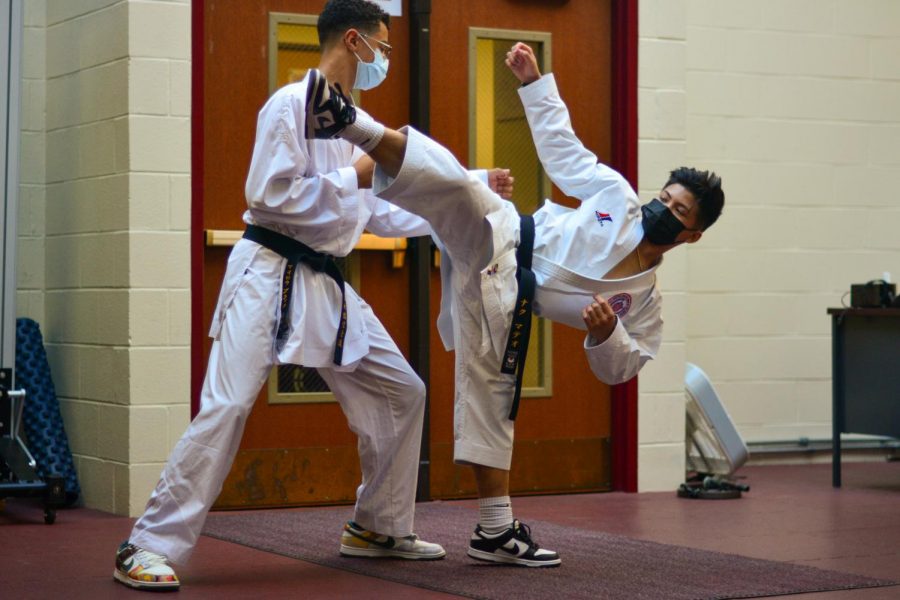Students excel at karate, gain experience at Under 15 World School Sport Games
This fall, ninth graders Milo Platz-Walker and Mateo Nacu traveled to Belgrade, Serbia, where they represented the Amateur Athletic Union USA National Karate Team.
October 5, 2021
Ninth graders Mateo Nacu and Milo Platz-Walker have traveled all over the country and the world. The two haven’t been dropping by far-flung locales like Scotland and Hawaii on a whim. They grew up on karate, and their skills have brought them to elite competitions all over the world. This fall, Milo and Mateo both added another stamp to their passports: Belgrade, Serbia.
Mateo and Milo represented the Amateur Athletic Union USA National Karate Team at the first International School Sport Federation Under 15 World School Sport Games in Belgrade.
Mateo won a bronze medal for 14/15 Male Kata, an event in which competitors are judged on their forms, while Milo placed in fifth for 14/15 Male Kumite, or sparring, in the under 63 kilogram weight division.
“I was really nervous towards the beginning, but once I got in the groove, I loosened up a bit,” Mateo said, “and it was just fun.”
Jay Nacu, a Lab primary school P.E. teacher and Mateo’s dad, coached Milo, Mateo and their teammates from Indiana and California. Alongside his wife, Denise Nacu, Mr. Nacu has led the Enso dojo, the center of the Lab karate community, since 2002 and the Lab after-school karate program since 2009.
“We have a very strong karate community at Lab,” Mr. Nacu said. “We have a couple other students who have competed internationally. And I think it’s made them better students and just all-around great people from their experiences that they’ve had throughout traveling and competing with different people from around the world.”
Milo and Mateo qualified for the games at the USA National Championships and the AAU Junior Olympic Games in the past year. As this was the inaugural year of the games, this was the first time the two could participate in the competition.
“Any other kind of sporting event or competition, there’s some athletes that are OK, and some that are outstanding. Sometimes it’s half and half,” Mr. Nacu said.
Here it was different.
He said, “Everyone was just really, really exceptional.”
The games were just as much about the sports themselves as they were about creating bonds between the 35 countries represented. Throughout the games, Mateo and Milo mixed and mingled with teens from all over the world.
“There was this thing called the Nations Night where other countries from all the different sports came to one place, and each country had a performance. It could be like a cultural dance, or just like anything,” Mateo said. Teens from the U.S. performed the ‘Cha-Cha Slide.’”
The AAU team’s experiences in Belgrade weren’t restricted to ISF programming. The teens also got to explore the city in their downtime.
“We walked around Serbia a lot. My legs were, like, sore. I was aching, but it was so nice,” Milo said. “We saw a massive church. We went and we saw a soccer game, which was pretty crazy. It gets very loud over there.”
The competition ran through the beginnings of the school year, so Milo and Mateo had to work with their teachers to keep up with a new workload in their first days of high school.
“Not only was I just starting school, but so were the teachers,” Milo said. “So they couldn’t really fully develop a lesson plan for me being in Serbia, and it was pretty late notice, but I think Mateo and I both did the best that we could.”
The two took away honors and experiences, as well as lessons to carry into their future karate careers.
“It’s a very big honor to have gone to the tournament,” Milo said. “But I think what’s bigger than that is the takeaways, like the lessons that I learned while actually competing and seeing an international tournament of that size.”
According to Mr. Nacu, the ISF sits under the International Olympic Committee, making the organization almost like a funnel into the games.
Milo and Mateo’s participation in the games could mean big things for their future careers.
“Karate was in the Olympics for the first time this year,” Mr. Nacu said. “And we’re not sure if it’s going to happen in the future, if they’re going to continue with it. But if it does, they’re at a prime age to maybe make an Olympic team sometime.”





























































